学术英语综合第六单元练习答案
英语专业综合英语Unit 6练习答案

Unit 6 Give Me Liberty, or Give Me Death课文I翻译1. 议长先生:我比任何人更钦佩刚刚在议会上发言的先生们的爱国主义精神和才干。
但是,对同样的问题,智者见智,仁者见仁。
因此,尽管我的观点与他们大相径庭,但是我仍要把自己的心里话一吐为快,并希望不要因此而被看做是对他们大不敬:现在不是讲客套的时候。
摆在议会面前的问题关系到国家的存亡。
我认为,这是关系到享受自由还是蒙受奴役的关键问题,而且正因为事关重大,我们的辩论就要做到各抒己见。
只有这样,我们才能弄清事实的真相,才能不辜负上帝和祖国赋予我们的责任。
在这种时刻,如果怕得罪人而闭口不言,我认为就是叛国,就是比对世上所有国君更为神圣的上帝的不忠行为。
2. 议长先生,对希望抱有幻觉是人的天性。
我们往往紧闭双眼不去正视痛苦的现实,而是倾听海妖蛊惑人心的歌声,让她把我们变成禽兽。
在为自由而进行艰苦卓绝的斗争中,这难道是聪明人的所作所为吗?难道我们愿意为对获得拯救如此至关重要的事情视而不见,听而不闻吗?就我来说,无论精神上有多么痛苦,我仍愿意获悉全部的真相和最坏的事态,并为之做好充分准备。
3. 我只有一盏指路明灯,那就是经验之灯。
除了过去的经验,我没有其他的方法去判断未来。
依据过去的经验,我倒希望知道,十年来英国政府的所作所为,凭什么使得各位先生有理由满怀希望,并欣然用来安慰自己和议会呢?难道就是最近接受我们请愿时的那种狡诈的微笑吗?不要相信这种微笑,阁下,事实证明那是放置在您脚下的陷阱。
不要被人家的亲吻把自己出卖了!请你们扪心自问,接受我们请愿时的和蔼亲善与遍布海陆疆域的大规模备战怎么会相称呢?难道出于对我们的爱护和和解,就有必要动用战舰和军队吗?难道我们流露过绝不和解的愿望,因此结果为了重新赢得我们的爱,而必须诉诸武力吗?我们不要再欺骗自己了,阁下,这些都是战争和征服的工具,是国王们采取的最后的辩解手段。
4. 我要请问先生们,阁下,这些战争的部署如果不是为了迫使我们俯首称臣,那又意味着什么?先生们能够指出还有其他的动机吗?难道在世界的这个地方,还有什么敌人值得大不列颠如此兴师动众,调集如此庞大的海陆军队吗?没有了,阁下,什么敌人也没有。
(完整版)英专综合教程6册课文翻译及课后答案Answertounit6
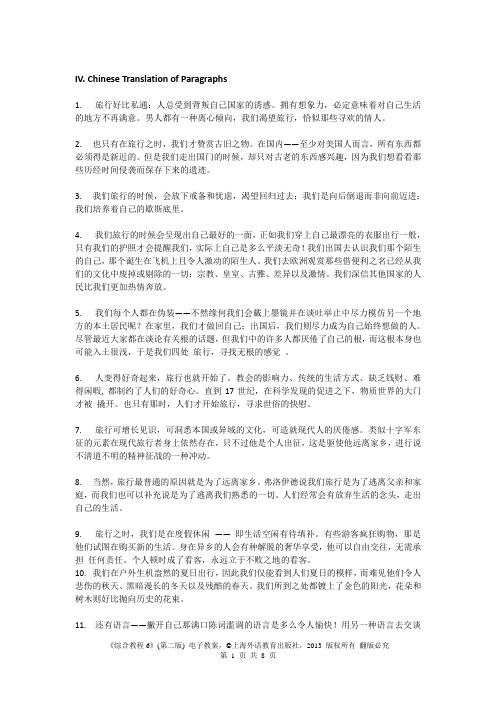
IV. Chinese Translation of Paragraphs1. 旅行好比私通:人总受到背叛自己国家的诱惑。
拥有想象力,必定意味着对自己生活的地方不再满意。
男人都有一种离心倾向,我们渴望旅行,恰似那些寻欢的情人。
2. 也只有在旅行之时,我们才赞赏古旧之物。
在国内——至少对美国人而言,所有东西都必须得是新近的。
但是我们走出国门的时候,却只对古老的东西感兴趣,因为我们想看看那些历经时间侵袭而保存下来的遗迹。
3. 我们旅行的时候,会放下戒备和忧虑,渴望回归过去;我们是向后倒退而非向前迈进;我们培养着自己的歇斯底里。
4. 我们旅行的时候会呈现出自己最好的一面,正如我们穿上自己最漂亮的衣服出行一般,只有我们的护照才会提醒我们,实际上自己是多么平淡无奇!我们出国去认识我们那个陌生的自己,那个诞生在飞机上且令人激动的陌生人。
我们去欧洲观赏那些借便利之名已经从我们的文化中废掉或剔除的一切:宗教、皇室、古雅、差异以及激情。
我们深信其他国家的人民比我们更加热情奔放。
5. 我们每个人都在伪装——不然缘何我们会戴上墨镜并在谈吐举止中尽力模仿另一个地方的本土居民呢?在家里,我们才做回自己;出国后,我们则尽力成为自己始终想做的人。
尽管最近大家都在谈论有关根的话题,但我们中的许多人都厌倦了自己的根,而这根本身也可能入土很浅,于是我们四处旅行,寻找无根的感觉。
6. 人变得好奇起来,旅行也就开始了。
教会的影响力、传统的生活方式、缺乏钱财、难得闲暇, 都制约了人们的好奇心。
直到17世纪,在科学发现的促进之下,物质世界的大门才被撬开。
也只有那时,人们才开始旅行,寻求世俗的快慰。
7. 旅行可增长见识,可洞悉本国或异域的文化,可造就现代人的厌倦感。
类似十字军东征的元素在现代旅行者身上依然存在,只不过他是个人出征,这是驱使他远离家乡,进行说不清道不明的精神征战的一种冲动。
8. 当然,旅行最普通的原因就是为了远离家乡。
弗洛伊德说我们旅行是为了逃离父亲和家庭,而我们也可以补充说是为了逃离我们熟悉的一切。
新核心综合学术英语教程 4 Unit 6 参考答案
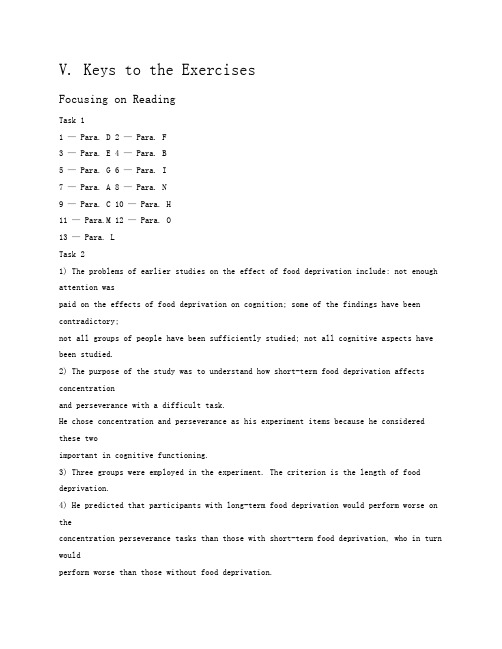
V. Keys to the ExercisesFocusing on ReadingTask 11 — Para. D2 — Para. F3 — Para. E4 — Para. B5 — Para. G6 — Para. I7 — Para. A 8 — Para. N9 — Para. C 10 — Para. H11 — Para.M 12 — Para. O13 — Para. LTask 21) The problems of earlier studies on the effect of food deprivation include: not enough attention waspaid on the effects of food deprivation on cognition; some of the findings have been contradictory;not all groups of people have been sufficiently studied; not all cognitive aspects have been studied.2) The purpose of the study was to understand how short-term food deprivation affects concentrationand perseverance with a difficult task.He chose concentration and perseverance as his experiment items because he considered these twoimportant in cognitive functioning.3) Three groups were employed in the experiment. The criterion is the length of food deprivation.4) He predicted that participants with long-term food deprivation would perform worse on theconcentration perseverance tasks than those with short-term food deprivation, who in turn wouldperform worse than those without food deprivation.The result was that food deprivation had no significant effect on concentration, and a significantTeacher’s Manual of an Integrated Academic English Course IV130effect on perseverance time, with the 12-hour group spending significantly less time on theperseverance task than either the control group or the 24-hour group, with no significant differencebetween the latter two groups.5) It was explained that the participants in the 12-hour group gave up more quickly on theperseverance task because of their hunger produced by the food deprivation, while the 24-hourgroup had developed “learned industriousness”. Another explanation was the motivational state ofparticipants, for the 12-hour group took the tests at 10 p.m., a prime time of the night for businessand socializing rather than for working on the puzzle.The first limitation of the study was the time of day when the respective groups took the tests, andthe second was the reasons of food deprivation; for example, fasting for religious reasons.Task 31) s 2) q 3) r 4) p 5) n 6) f7) g 8) m 9) k 10) l 11) i 12) j13) h 14) e 15) t 16) d 17) b 18) c19) a 20) o 21) x 22) v 23) w 24) uTask 4SentencesChineseequivalentsSynonyms1) The number of wells is a fair indicator of thedemand for water.指标,指示物index, display, signal, sign2) Body temperatures can fluctuate when you areill.波动,变动oscillate, change, alter, vary,vacillate3) Unemployment is a chronic problem in thiscountry.长期的,慢性的constant, deep-rooted, deep-seated,persistent, ineradicable4) I requested a copy of the form. 请求,要求demand, ask for, appeal for, put infor, desire, pray for, put forward,beg for5) She then proceeded to criticize the way I did it. 开始,继续进行continue, carry on, go on, go ahead, advance, continue6) Consumption of alcohol impairs your ability todrive.损害,削弱spoil, injure, decrease, weaken,damage, worsen, diminish,reduce, reduce, undermine, harm7) We need to designate someone as our spokesperson. 指定,指派name, appoint, choose8) Can my child be medically examined withoutmy consent?同意sanction, approval, assent,permission, agreement,acquiescence9) They’ve been deprived of the fuel necessary toheat their homes.剥夺,使丧失strip, rob, dispossess131Unit 6 The Effects of Food DeprivationSentencesChineseequivalentsSynonyms10) Many slopes are rock fields with sparse vegetation. 稀疏的,稀少的scarce, meager, sporadic, scattered, scanty11) He surmised that he had discovered one of theillegal streets.猜测,推断infer, guess, speculate, deduce,conclude, predicate, theorize12) Freud postulated that we all have a death instinct. 假定,认为presume, suspect, assume, presuppose, suppose, hypothesizeThe most formal ones are: fluctuate, oscillate, vacillate, ineradicable, undermine, sanction,acquiescence, sparse, meager, sporadic, surmise, hypothesizeTask 51) According to some researchers, most of the results so far prove that short-termfasting does notaffect cognitive function very much. However, it is too early to draw the conclusion because there isnot enough research on the cognitive functions such as concentration and perseverance. 2) In general, we found our hypothesis supported by the data, as 12 hours of food deprivation wouldgreatly affect perseverance when compared to no deprivation. Unexpectedly, 24 hours of fooddeprivation did not influence perseverance much when compared with the control group.3) We guess that the participants who were deprived of food for 12 hours gave up more quickly on theperseverance task because of hunger. But why didn’t 24-hour food deprivation produce the sameeffect? We assume that it is because of “learned industriousness” which means participants whoperform one difficult task do better on a following task than those who never took the f irst task.Task 6Summary: Future researches on food deprivation and cognition could include the effects of short-termfood deprivation on other aspects of cognition, exploration of longer-term fooddeprivation periods andthe effects of food deprivation on learned industriousness.Task 7Food deprivation has been found to affect people’s ability to focus on a task in previous studies, butnot much attention has been paid to the effects of food deprivation on cognition.①This study intendedto explore how short-term food deprivation affects concentration and perseverance with a difficulttask.②Qualified participants were divided into the control group(with no food deprivation), 12-hourfood deprivation group and 24-hour food deprivation group and they were assigned tofinish theconcentration tasks and perseverance tasks.③It was found that food deprivation had no significant effecton concentration, 12 hours of food deprivation greatly affected perseverance when compared to nodeprivation while 24 hours of food deprivation did not influence perseverance much.④“ Learnedindustriousness” and the motivational state of participants were the possible explanations for theresults.⑤The study provides some insights into the cognitive and physiological effects of skipping meals.(Continued )Teacher’s Manual of an Integrated Academic English Course IV132① the objective ② methods used ③ findings④ explanation ⑤ implicationTask 8(omitted)Task 9(omitted)Task 10(omitted)Research Paper WritingTask 1Function: Describe the outline of the talkFunction: Introduce the topicFunction: Indicate the shift from one idea to anotherFunction: Giving closing remarksFunction: Summarize the talkTask 2Will our city be buried under the sea in one thousand years time? It sounds funny but with theeffects of global warming becoming more and more serious, this may become true in the future. I’mgoing to discuss with you today the effects of global warming. I will concentrate on the three effects ofglobal warming in my presentation today: first, global warming causes melting glaciers and rising sealevels; second, global warming leads to climate change and has an impact on wild animals’ behaviorand habitat; the last effect is the retreating snowlines and death of some species of trees.Task 31) How many hours of sleep did you get last night?The lecture began with the question to arouse the listeners’ interest.2) The major points are the causes of sleep deprivation and its effects.He presented them in the first paragraph to give the listeners a general view of the content.3) The transitional words: but, however, as a result, also4) To illustrate difficult or abstract points.5) The rhetorical questions:In fact, did you know that more than 30 percent of American adults work more than f ifty hours aweek?How many of you would say that ... that you don’t go to sleep when you should because of the TVor the Internet?Rhetorical questions are used to catch the listeners’ attention.6) Colloquial expressions include: OK, well, let’s, yeah, now, yes, eh, as you can see. 133Unit 6 The Effects of Food DeprivationThe speaker uses them to talk to the audience instead of reading to them.7) The talk differs from a formal essay in several aspects: f irst, the talk uses colloquial words,like well, let’s, OK, etc.; the talk uses simpler language, like short sentences; third, the talk usescontractions, like don’t.Task 4(omitted)Task 5(omitted)Task 6(omitted)Task 7(omitted)Task 8(omitted)Task 9(omitted)Task 10Sentences to elicit questions from the audience:— Are there any questions you’d like to ask?— Feel free to ask questions if you have any.— I’d be glad to answer any questions at the end of my talk.— Alright. Now, any questions or comments?Strategies dealing with questions and answers:— Ask for repetition or clarification if necessary“. Do you mean ...?”— Check that the question is relevant. If not, don’t answer if you don’t want to.“I’m afraid that’soutside the scope of my talk / this session.”— Refer questioner to another person if you can’t answer.“ I don’t think I’m the right person to answerthat. Perhaps (Mr. Holmes) can help ...”— Check that the questioner is satisfied with your answer: eye contact and a pause is often sufficient.“Does that answer your question?”Task 11(omitted)Task 12(omitted)Task 13(omitted)Task 14(omitted)Teacher’s Manual of an Integrated Academic English Course IV134Academic Survival SkillsTask 1Abstract:The study aims to find out the Fudan university students’ knowledge of anthropogenic climatechange. We designed a questionnaire including eight questions and gave it to 40 students, who weredivided into majors and non-majors in different grades. News media was found to be themost populardevice to make sense of information, but the classroom education is more important for majors tounderstand some professional knowledge. Another major finding of this study was that students’understanding of the anthropogenic global warming becomes more comprehensive in pace with gradeincreasing.Introduction:Error 1: It’s an interesting context to study appropriating of knowledge and sense making with respectto anthropogenic global warming.Revised: It is significant to study appropriating of knowledge and sense making with respect toanthropogenic global warming.Error 2: Henning Finsereas and his partners relies on data from the 2005—09 World Values Surveyto examine individual and cross-national variation in perception of seriousness of global warming,and show that a large majority of public in all countries are concerned about the problem of globalwarming.Revised: Henning Finsereas and his partners rely on data from the 2005—09 World Values Survey toexamine individual and cross-national variation in perception of seriousness of global warming, andshow that a large majority of the public in all countries are concerned about the problem of globalwarming.Error 3: Everyone wants to know what terrible things happened to the Earth and what influence to ourlife.Revised: Everyone wants to know what terrible things happen to the Earth and what influence theyhave on our life.Error 4:“ There is strong evidence that the warming of the Earth over the last half-century has beencaused largely by human activity, such as the burning of fossil fuels”(Royal Society, 2010:1).Revised: The citation should be included in the references.Error 5: However, environmental change is not just the single factor of anthropogenic influence, andit’s a complex interactions.Revised: However, environmental change is not just the single factor of anthropogenic influence whichresults from complex interactions.Error 6: This paper study how the people reason about and make sense of human-made global warming,based on some interviews with the Fudan University students.Revised: This paper studies how people reason about and make sense of human-made global warming,135Unit 6 The Effects of Food Deprivationbased on some interviews with Fudan University students.Error 7: It shows that the domestication of climate science knowledge was shaped through foursense-making devices: news media, some experts’ disagreement about global warming (included theclassroom education), observations of political inaction, and considerations with respect to everydaylife.Revised: It shows that the domestication of climate science knowledge was shaped through foursense-making devices: news media, some experts’ disagreement about global warming (including theclassroom education), observations of political inaction, and considerations with respect to everydaylife.Error 8: The study is based on eight focus group interviews with the students at school, include theenvironmental science majors and non-professional students.Revised: The study is based on eight focus group interviews with the students at school,including theenvironmental science majors and non-professional students.Error 9: In these groups, with the exception of a smaller number, it was commonly accepted as a factthat anthropogenic global warming is under way.Revised: In these groups, with the exception of a small number, it was commonly accepted as a factthat anthropogenic global warming was under way.Error 10: The paper explores the ways of reasoning that produce these diverse positions, meanwhile,obtain the college awareness of global warming.Revised: The paper explores the ways of reasoning that produced these diverse positions and,meanwhile, it obtains the college awareness of global warming.Conclusion:Error 1: The results of questionnaire provide the following findings.Revised: The results of the questionnaire provide the following findings.Error 2: Because global warming is a hot topic, whether it is professional or not professional students,the majority are very concerned about the climate change.Revised: Because global warming is a hot topic, the majority of the students, professional or nonprofessional,are very concerned about climate change.Error 3: Furthermore, strong f low of information with the development of networks and smart phone,contribute to the people understanding of various academic fields, even some highly specializedknowledge.Revised: Furthermore, the strong f low of information brought by the development of networks andsmart phones contributes to people’s understanding of various academic fields, even some highlyspecialized knowledge.Error 4: The information resource has diversiform form, such as news media, classroom education,government documents and considerations with respect to everyday life.Revised: The information resource has diverse forms, such as news media, classroom education,government documents and considerations with respect to everyday life.Teacher’s Manual of an Integrated Academic English Course IV136Error 5: News media is the main resource in today’s information age. But for majors in university,classroom education gives more professional knowledge and correct sense-making. Revised: News media is the main resource in today’s information age, but for majors in university,classroom education gives more professional knowledge and correct sense-making.Error 6: So many sense-making devices give high-capacity information to people, and it’s not allsources of information have meticulous certification.Revised: So many sense-making devices give high-capacity information to people, but not all sourcesof information have meticulous certification.Error 7: Perhaps, the reason is that college atmosphere more open compared to a high school education,and give the opportunity to exchange various academic fields.Revised: Perhaps the reason is that college atmosphere is more open compared with high schooleducation, and gives the opportunity to exchange various academic fields.References:Error 1: BeritKvaloy, HeningFinseraas, OlaListhaug, 2012. The publics’ concern for global warming:A cross-national study of 47 countries. Journal of Peace Research, 49 (1), 11—22. Revised: Kvaloy, B, H. Finseraas and O. Listhaug. 2012. The publics’ concern for globalwarming: Across-national study of 47 countries. Journal of Peace Research, 49 (1): 11—22.Error 2: LeeAnnKahlor, Sonny Rosenthal, 2009. If we seek, do we learn?: predicting knowledge ofglobal warming. Science Communication, 380 originally published online 7 January 2009. Revised: Kahlor, L. and S. Rosenthal. 2009. If we seek, do we learn?: predicting knowledge of globalwarming. Science Communication, 380 originally published online 7 January 2009.Error 3: LI LiJuan, WANG Bin, ZHAOTianJun, 2007. Impacts of external forcing on the 20th centuryglobal warming. Chinese Science Bulletin, 52(22), 3148—3154.Revised: LI, LiJuan, WANG Bin, ZHAOTianJun, 2007. Impacts of external forcing on the 20th century global warming. Chinese Science Bulletin 52(22): 3148—3154.Error 4: Nicholas Smith, Helene Joffe, 2013. How the public engages global warming: A socialrepresentations approach. Public Understanding of science, 22, 16—32.Revised: Smith, N and Helene Joffe. 2013. How the public engages global warming: A social representations approach. Public Understanding of science 22: 16—32.Error 5: W. S. Broecker, 2006. Global warming: take action or wait? Chinese Science Bulletin, 51(9),1018—1029.Revised: Broecker, W. S. 2006. Global warming: take action or wait? Chinese Science Bulletin, 51(9):1018—1029.137。
《学术英语(综合)》课后答案
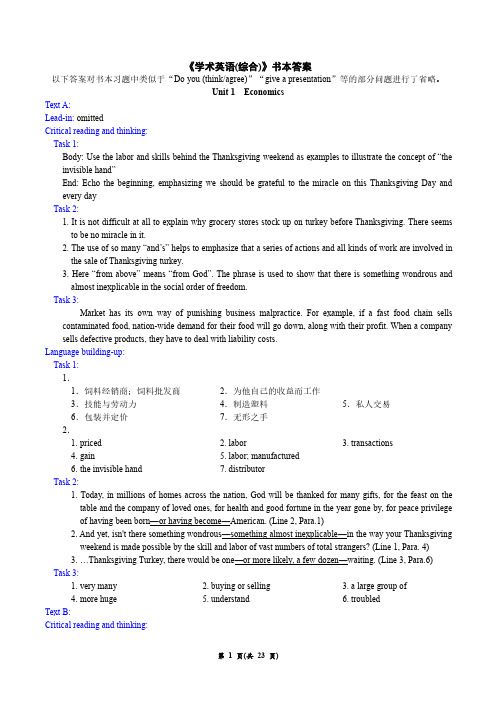
《学术英语(综合)》书本答案以下答案对书本习题中类似于“Do you(think/agree)”“give a presentation”等的部分问题进行了省略。
Unit1EconomicsText A:Lead-in:omittedCritical reading and thinking:Task1:Body:Use the labor and skills behind the Thanksgiving weekend as examples to illustrate the concept of“the invisible hand”End:Echo the beginning,emphasizing we should be grateful to the miracle on this Thanksgiving Day and every dayTask2:1.It is not difficult at all to explain why grocery stores stock up on turkey before Thanksgiving.There seemsto be no miracle in it.2.The use of so many“and’s”helps to emphasize that a series of actions and all kinds of work are involved inthe sale of Thanksgiving turkey.3.Here“from above”means“from God”.The phrase is used to show that there is something wondrous andalmost inexplicable in the social order of freedom.Task3:Market has its own way of punishing business malpractice.For example,if a fast food chain sells contaminated food,nation-wide demand for their food will go down,along with their profit.When a company sells defective products,they have to deal with liability costs.Language building-up:Task1:1.1.饲料经销商;饲料批发商2.为他自己的收益而工作3.技能与劳动力4.制造塑料5.私人交易6.包装并定价7.无形之手2.1.pricedbor3.transactions4.gainbor;manufactured6.the invisible hand7.distributorTask2:1.Today,in millions of homes across the nation,God will be thanked for many gifts,for the feast on thetable and the company of loved ones,for health and good fortune in the year gone by,for peace privilege of having been born—or having become—American.(Line2,Para.1)2.And yet,isn't there something wondrous—something almost inexplicable—in the way your Thanksgivingweekend is made possible by the skill and labor of vast numbers of total strangers?(Line1,Para.4)3.…Thanksgiving Turkey,there would be one—or more likely,a few dozen—waiting.(Line3,Para.6) Task3:1.very many2.buying or selling3.a large group of4.more huge5.understand6.troubledText B:Critical reading and thinking:Task1:1.Considering that her boyfriend doesn’t even bother to choose a gift for her,the girl concludes that hedoesn’t love her.Therefore,she breaks off the relationship.In the case where the strength of affection is most in question,people care a lot about what is given as a gift.2.The following is one more example where the signaling theory can be applied:In the job market,anemployer may not know whether a candidate is qualified for a post or not.Very often,the candidate will show the employer education credentials,which can be used as a signal to the employer.Thus the information gap is narrowed.Task2:(以下所有表格题若未说明,顺序皆为从上到下,从左到右)Internet browser;Windows operating system;deter;entering the market and offering new products;cars today include many built-in products;monopoly;80;reliable;easier to use;severely limited;changing;competitors;low;Researching:The U.S.economy is a free market economy with some government regulation ad there has been a lasting debate about how much government regulation is necessary.Those who argue for less regulation claim that the free market itself will require business to protect consumers and provide good products or services and the interference from the government can do nothing but increase the cost of doing corporations are not concerned about the public’s interest,so regulation is indispensable.Interestingly, Adam Smith himself believed that government had an important role to play in economic life.For example, he believed that the government should enforce contracts and grant patents and copyrights.Text C:Task:每一个精明的一家之主都知道,如果买一样东西所花的钱比在家里自己生产所花的成本要小,那就永远不要尝试在家里生产。
新时代研究生学术英语综合教程1第六单元
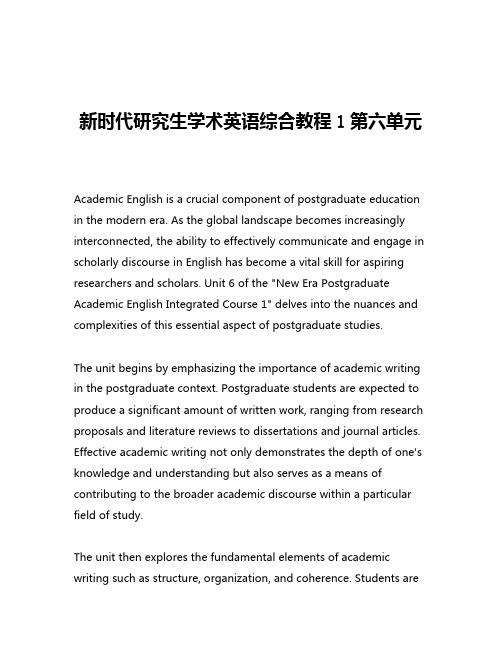
新时代研究生学术英语综合教程1第六单元Academic English is a crucial component of postgraduate education in the modern era. As the global landscape becomes increasingly interconnected, the ability to effectively communicate and engage in scholarly discourse in English has become a vital skill for aspiring researchers and scholars. Unit 6 of the "New Era Postgraduate Academic English Integrated Course 1" delves into the nuances and complexities of this essential aspect of postgraduate studies.The unit begins by emphasizing the importance of academic writing in the postgraduate context. Postgraduate students are expected to produce a significant amount of written work, ranging from research proposals and literature reviews to dissertations and journal articles. Effective academic writing not only demonstrates the depth of one's knowledge and understanding but also serves as a means of contributing to the broader academic discourse within a particular field of study.The unit then explores the fundamental elements of academic writing such as structure, organization, and coherence. Students areintroduced to the typical structure of academic essays and research papers, which often include an introduction, body, and conclusion. They learn how to effectively organize their ideas and arguments in a logical and cohesive manner, ensuring that their written work is easy to follow and comprehend.One of the key aspects of academic writing highlighted in this unit is the use of appropriate language and style. Postgraduate students are expected to adopt a formal and academic tone in their writing, avoiding colloquial or conversational expressions. They are also taught to use precise and concise language, as well as to incorporate relevant academic vocabulary and terminology.Another crucial component of academic writing covered in this unit is the importance of citing sources and acknowledging the work of others. Postgraduate students are expected to demonstrate their ability to engage with and build upon existing scholarly literature. They learn how to properly cite sources using recognized citation styles, such as APA or MLA, and how to integrate these citations seamlessly into their own writing.The unit also delves into the nuances of academic argumentation and the development of a strong thesis statement. Postgraduate students are encouraged to formulate clear and well-supported arguments, drawing upon relevant evidence and research tosubstantiate their claims. They learn how to craft a compelling thesis statement that serves as the foundation for their written work.Additionally, the unit addresses the importance of critical thinking and analysis in academic writing. Postgraduate students are expected to move beyond mere description and engage in critical evaluation and synthesis of existing knowledge. They are taught how to critically analyze sources, identify gaps or limitations in the literature, and develop their own unique perspectives and insights.Finally, the unit emphasizes the significance of revising and editing one's written work. Postgraduate students are encouraged to view writing as an iterative process, where multiple drafts and rounds of editing are necessary to produce a polished and coherent final product. They learn strategies for self-editing, such as proofreading for grammatical and spelling errors, as well as techniques for seeking feedback and incorporating revisions.Throughout the unit, students are provided with numerous opportunities to apply the concepts and skills they have learned through practical exercises and assignments. These activities are designed to help students develop their academic writing abilities and prepare them for the rigors of postgraduate research and publication.In conclusion, Unit 6 of the "New Era Postgraduate Academic English Integrated Course 1" is a comprehensive and invaluable resource for postgraduate students seeking to enhance their academic writing skills. By mastering the techniques and strategies covered in this unit, students can position themselves for success in their postgraduate studies and contribute meaningfully to the broader academic community.。
(外研社)高等学校研究生英语综合教程下第6单元课后答案及解析

➢We shall pay any price, bear any burden, meet any hardship, support any friend, and oppose any foe, in order to _a_s_s_u_re__th_e__su_r_v_i_v_a_l _an_d__t_h_e_s_u_c_ce_s_s_o_f__li_b_e_rt_y____________.
.
Reading Focus – Global Understanding
Body ➢To our sister republics uth of our border, we offer a special
pledge to _a_s_s_is_t_f_re_e_m__e_n_a_n_d__fr_e_e_g_o_v_e_r_n_m__en_t_s_i_n_c_a_s_ti_n_g____ _o_ff__th_e__ch_a_i_n_s_o_f_p_o_v_e_r_ty______. ➢To that world assembly of sovereign states, the United Nations, we renew our pledge of support to _s_tr_e_n_g_th_e_n__it_s_s_h_ie_l_d______ _o_f_t_h_e_n_e_w__a_n_d_t_h_e_w__ea_k__a_n_d_t_o_e_n_l_a_rg_e__th_e__ar_e_a_i_n_w__h_ic_h__it_s___ _w_r_i_t _m_a_y__ru_n_______________. ➢To our adversary, we offer a request: _t_h_a_t _b_o_th__s_id_e_s_b_e_g_i_n___ _a_n_e_w__th_e__q_u_es_t_f_o_r_p_e_a_c_e_______
学术综合英语参考答案6
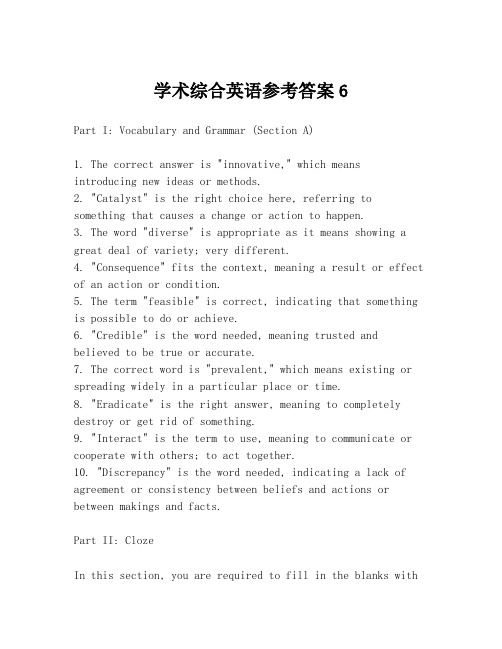
学术综合英语参考答案6Part I: Vocabulary and Grammar (Section A)1. The correct answer is "innovative," which means introducing new ideas or methods.2. "Catalyst" is the right choice here, referring to something that causes a change or action to happen.3. The word "diverse" is appropriate as it means showing a great deal of variety; very different.4. "Consequence" fits the context, meaning a result or effect of an action or condition.5. The term "feasible" is correct, indicating that something is possible to do or achieve.6. "Credible" is the word needed, meaning trusted and believed to be true or accurate.7. The correct word is "prevalent," which means existing or spreading widely in a particular place or time.8. "Eradicate" is the right answer, meaning to completely destroy or get rid of something.9. "Interact" is the term to use, meaning to communicate or cooperate with others; to act together.10. "Discrepancy" is the word needed, indicating a lack of agreement or consistency between beliefs and actions or between makings and facts.Part II: ClozeIn this section, you are required to fill in the blanks withthe appropriate words or phrases from the given options. Here are the correct answers:11. enhance - To make something greater in quality, value, or extent.12. manifestations - Clear signs or indications of something.13. articulate - To express something clearly and effectively.14. conducive - Helping to make something happen or be successful.15. intrinsic - Belonging naturally; essential to something.16. scrutiny - Careful examination or inspection.17. perpetuate - To keep something going continuously.18. substantiate - To provide proof or evidence for a claim.19. alleviate - To make something less severe or painful.20. paradigm - A typical example or pattern of something; a model.Part III: Reading Comprehension21. According to the passage, the correct answer is that the author believes the importance of education is to empower individuals.22. The passage suggests that the primary reason for the decline in traditional education is the rapid development of technology.23. The author argues that the future of education will be shaped by personalized learning experiences.24. In the context of the passage, the term "collaborative learning" refers to students working together to achieve common goals.25. The author concludes that the key to successful educationin the future is adaptability and innovation.Part IV: Translation26. 教育的目的不仅仅是传授知识,更重要的是激发学生的创造力和批判性思维。
学术英语Unit 6 课后练习答案

Unit 6 Consumer Behavior
• Text B
The Customers’ Revenge
– – – –
Critical thinking and reading Supplementary analysis Collocations Suggested answers
Unit 6 Consumer Behavior
Text A
Critical reading and thinking
Language Support
2. … this family was in the know and could afford expensive Western brands. (Line 3, Para.10)
Unit 6 Consumer Behavior
